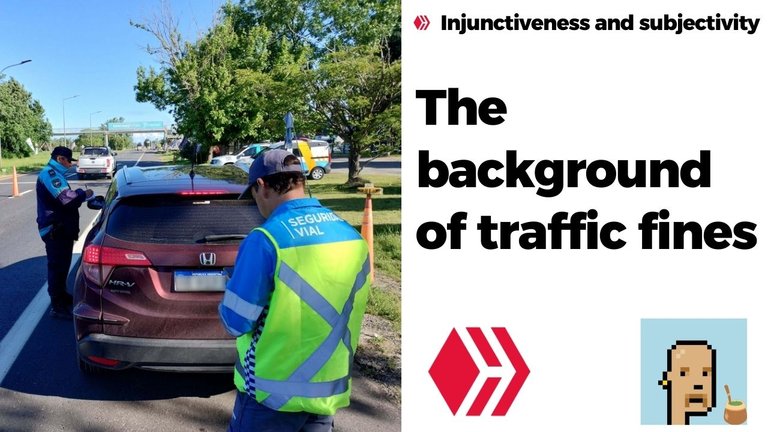Welcome Hive users, after the idea of writing about traffic agents, the system itself, came to me... I bring a series of subjective concepts in my opinion, about what fines are, why they exist, and why they only affect poor people. While we can talk about the control that is required in a society, on busy streets or when there are a lot of people, it is also necessary to deconstruct the idea that not everything serves the good of society, there are also interests submerged in them, and I will tell something that happened to me during the Covid-19 pandemic on this subject.
El 20 de marzo comenzó el aislamiento obligatorio en argentina, cuando luego que el mundo sufriera la pandemia por el coronavirus, muchos trabajadores quedaron varados en un sin fin de preocupaciones no solo por su salud, sino por el cómo traer el pan a su hogar, por mi parte tuve mucho miedo e incertidumbre por mi presente y mi futuro, no solo por mi salud, sino por mi trabajo, pero luego de dos semanas las puertas de mi trabajo abrieron y pude salir a trabajar (me disculpo si las fechas no coinciden exactamente, pero al punto que me dirijo es el mismo). Yendo a trabajar con mi moto, con todos los permisos y reglamentos al día, me detiene un control de tránsito, y por no tener el seguro al día (lo tenía, pero no en PDF) me quieren retener la moto, luego de discutir, acudió un conocido que trabaja en la aseguradora que contrate, y pudo sacarme del lio, ellos, se burlaron de mí, incluso tengo grabaciones del hecho. La cuestión es que pude librarme de esto, pero la multa siguió en pie hasta que la pague hace unos meses, luego de que me robaran mi moto, y para cobrar el seguro, tenía que saldar esta deuda. En su momento, la multa representaba el 16,67% de lo que cobraba, unos 10.000 pesos (cuando cobraba 60.000) aproximadamente.
On March 20, mandatory isolation began in Argentina, when after the world suffered the coronavirus pandemic, many workers were stranded in endless worries not only about their health, but about how to bring bread home, for my part I was very afraid and uncertain about my present and my future, not only for my health, but for my work, but after two weeks the doors of my job opened and I was able to go to work (I apologize if the dates do not coincide exactly, but the point I am getting to is the same). Going to work with my motorcycle, with all the permits and regulations up to date, a traffic control stops me, and because I do not have the insurance up to date (I had it, but not in PDF) they want to retain my motorcycle, after arguing, an acquaintance who works at the insurance company I hired came and was able to get me out of the mess, they made fun of me, I even have recordings of the event. The thing is that I was able to get out of it, but the fine remained until I paid it a few months ago, after my motorcycle was stolen, and in order to collect the insurance, I had to settle this debt. At the time, the fine represented 16.67% of what I was earning, approximately 10,000 pesos (when I was earning 60,000).

La conclusión es que si, la termine pagando, con interés por el tiempo que paso aproximadamente unos 4/5 años, pero en este caso quiero preguntarles, ¿les parece justo el multar con un monto fijo? Creo que no, hay quienes perciben mucho dinero, y hay otros como yo (inclusive hoy en día) que no podríamos subsistir si nos multaran (sea válido o no la multa), ni tampoco el tiempo que perdes, cuando apenas tienes para vivir, y me refiero no solo al tiempo, sino también al dinero. Hay una concepción de multar con dinero para que el ciudadano aprenda a que no debe romper las normas, cumplir sus obligaciones sociales, y estoy de acuerdo con ello, pero no es justo multar a alguien que gana, como ejemplo, 1000 dólares al mes, a quien gana 300 al mes, y es una cuestión de números, le podés llegar a arruinar la vida, por exagerar, cuando apenas tiene para comer, hacerle pagar una suma que representa el no poder comer durante un tiempo.
The conclusion is that yes, I ended up paying it, with interest for the time I spent, approximately 4/5 years, but in this case I want to ask you, do you think it is fair to fine with a fixed amount? I don't think so, there are those who earn a lot of money, and there are others like me (even today) who could not survive if we were fined (whether the fine is valid or not), nor the time you lose, when you barely have enough to live on, and I am not referring only to time, but also to money. There is a concept of fining with money so that citizens learn not to break the rules, to fulfill their social obligations, and I agree with that, but it is not fair to fine someone who earns, for example, 1000 dollars a month, to someone who earns 300 a month, and it is a question of numbers, you can end up ruining their life, by exaggerating, when they barely have enough to eat, making them pay an amount that represents not being able to eat for a while.

Esto me lleva a mi punto de vista, LAS MULTAS, SON SOLO PARA EL PUEBLO Y LOS POBRES, no representa una amenaza para quienes incumplen las normas, y el pagar dichas multas no representan más que un vuelto, una salida fácil para el que puede incumplirlas sin miedo a las represarías, por eso creo que las multas tendrían que ser un porcentaje de lo que se gana, para no arruinar a la persona, podemos hablar de lo cultural, que hay países que no existen leyes de tránsito, o donde existe una peor mafia que en argentina en temas de este tipo, pero no por eso debemos acostumbrarnos y vivir aceptándolo de todas formas. Si la multa representa un 10% de lo que ganas, sería factible si todos blanquearamos las ganancias, cosa que no muchos estan de acuerdo.
This brings me to my point of view, FINES ARE ONLY FOR THE PEOPLE AND THE POOR, they do not represent a threat to those who break the rules, and paying said fines do not represent more than change, an easy way out for those who can break them without fear of reprisals, that is why I think that the fines should be a percentage of what is earned, so as not to ruin the person, we can talk about the cultural, that there are countries where there are no traffic laws, or where there is a worse mafia than in Argentina in issues of this type, but that does not mean we should get used to it and live accepting it anyway. If the fine represents 10% of what you earn, it would be feasible if we all whitewashed the earnings, something that not many agree with.

Tengo conocidos que incluso tienen el poder de borrarte multas, pero quien no tenga el recurso de los vínculos, o del dinero, o de ambas, no podrá pelear cuando la multa no es válida, simplemente el sistema de expulsa, por eso mismo no creo que el sistema de tránsito sea con buena intención en contra de quienes incumplan las normas, sino que es para cobrar impuestos a quienes siempre terminan pagando, porque las represarías influyen muchísimo más en la vida de la gente sin recursos de las que sí, quienes pueden pagar una multa de 100.000 pesos no le será doloroso, quienes no pueden pagarla, si, les afecta más en la vida que en el respeto hacia las leyes, haciéndolos rencorosos del sistema, de la gente de tránsito, de las leyes, o incluso de su propia vida.
I have acquaintances who even have the power to erase fines, but whoever does not have the resource of ties, or money, or both, will not be able to fight when the fine is not valid, the system simply expels them, for that reason I do not believe that the traffic system is with good intentions against those who break the rules, but rather it is to collect taxes from those who always end up paying, because retaliation influences the lives of people without resources much more than those who, yes, those who can pay a fine of 100,000 pesos will not find it painful, those who cannot pay it, yes, it affects their lives more than their respect for the laws, making them resentful of the system, of the traffic people, of the laws, or even their own lives.
 Spanish translation and its source
Spanish translation and its source
- The value of traffic fines in Buenos Aires varies depending on the infraction. For example, the fine for speeding can range from $200,400 to $1,336,000, while the fine for driving without a license can be 50 UF.
Some of the most common traffic fines in Buenos Aires are:
Speeding
Not wearing a seat belt
Running a red light
Driving in the wrong direction
Driving under the influence of alcohol
Driving with an expired VTV
Driving without the required age or license
Lack of documentation or insurance
Excess occupants

Creo que la sociedad requiere un control, pero no hay control cuando hay injusticias, es algo utópico de mi parte, pero los cambios no se hacen a castigo, si hay una cultura más rica en el hecho de que podemos ser mejores, con un control sistemático de mejor y mayor envergadura, podríamos cambiar las reglas para que nadie se salga con la suya, así ser más respetuosos entre nosotros, y mejorar todo el sistema mismo que hace años está podrido. Como indica la imagen de arriba, no podes multar a quien gana 1.000.000 de pesos al mes (1000 dólares) hacer pagar 1.336.000 de pesos, sabiendo que tiene que pagar el alquiler, comida, transporte, entre todos los demás gastos, arruinando su economía, y quitando un consumidor del mercado por una multa que quizá, por enojo, por bronca, o por no poder, no la pagara, hasta que quizá sea demasiado tarde.
I think society requires control, but there is no control when there are injustices, it is something utopian on my part, but changes are not made as punishment, if there is a richer culture in the fact that we can be better, with a systematic control of better and greater scope, we could change the rules so that no one gets away with it, thus being more respectful among ourselves, and improving the entire system itself that has been rotten for years. As the image above indicates, you cannot fine someone who earns 1,000,000 pesos a month (1000 dollars) and make them pay 1,336,000 pesos, knowing that they have to pay rent, food, transportation, among all the other expenses, ruining their economy, and removing a consumer from the market for a fine that perhaps, out of anger, rage, or inability, they will not pay, until it may be too late.













